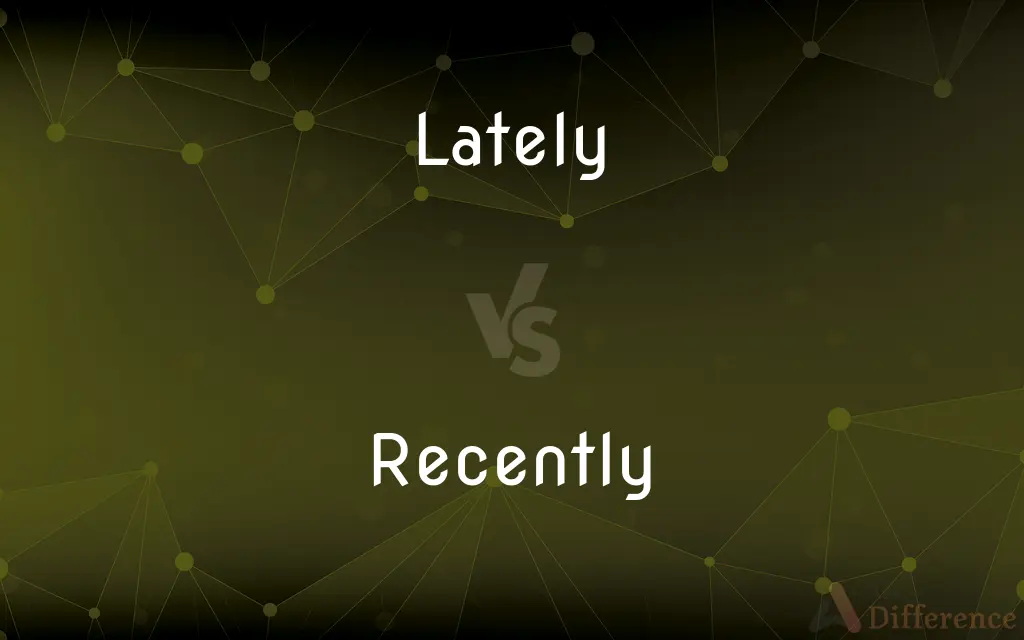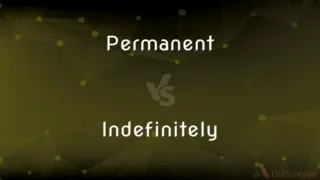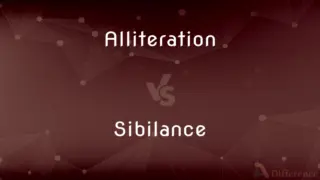Lately vs. Recently — What's the Difference?
By Tayyaba Rehman & Urooj Arif — Updated on May 3, 2024
"Lately" refers to actions or events occurring close to the present, continuously over recent times, while "recently" indicates something happened just a short time ago.

Difference Between Lately and Recently
Table of Contents
ADVERTISEMENT
Key Differences
"Lately" implies a continuity or a series of events or conditions happening over a period leading up to the present. It suggests ongoing activity or status within the recent past. On the other hand, "recently" refers to a specific point or event that occurred in the near past, highlighting a single occurrence rather than an ongoing sequence.
When using "lately," one often discusses trends or changes that have been observed over some time, such as habits or weather conditions. For example, someone might say, "It has been raining a lot lately." Whereas, "recently" is used to denote particular events or actions that took place, such as "She visited Paris recently."
In conversation, "lately" can suggest a concern or interest in the continuation or change of a state or activity. It often carries a connotation of something being noticed over time, implying a potential for ongoing relevance. Conversely, "recently" usually refers back to a concluded situation or event with no implicit continuation.
In terms of usage, "lately" is generally associated with the present perfect tense, aligning with its nature of covering a period up to now. For instance, "Have you seen him lately?" In contrast, "recently" fits well with both the present perfect and simple past tenses, depending on whether the speaker connects the action to the present or not, as in "I saw him recently."
While "lately" is more common in informal spoken English, emphasizing more personal, subjective observations of time, "recently" is used in both formal and informal contexts, suitable for precise and objective references to recent past events.
ADVERTISEMENT
Comparison Chart
Temporal Focus
Continuous period leading up to the present
Specific point or event in the near past
Connotation
Ongoing or recurring actions/events
Single, specific occurrences
Common Usage
In relation to trends or changes
Mentioning particular events or actions
Linguistic Context
Often used with the present perfect tense
Used with present perfect and simple past
Formality
More common in informal contexts
Used in both formal and informal contexts
Compare with Definitions
Lately
Suggests observations or changes noticed over the recent period.
Lately, the weather has been unpredictable.
Recently
Used to specify actions or events that occurred a short time ago.
They recently completed the project.
Lately
Referring to recent times continuously up to the present.
I haven't felt like myself lately.
Recently
Pertaining to a time just before the present.
He moved here recently.
Lately
Used to describe an ongoing situation or trend.
He has been very busy lately.
Recently
Often used to introduce new information.
Recently, I’ve started a new diet.
Lately
Implies a period of time just before the current moment.
Sales have been down lately.
Recently
Implies nearness to the present without continuity.
She recently passed her driving test.
Lately
Indicates repeated or habitual actions in recent times.
She’s been going to bed late lately.
Recently
Refers to a specific instance in the close past.
I recently heard about that movie.
Lately
Recently; not long ago
She hasn't been looking too well lately
Recently
Of, belonging to, or occurring at a time immediately before the present.
Lately
Not long ago; recently.
Recently
Modern; new.
Lately
Recently; not long ago; of late.
I'd lately returned from Japan.
It's only lately that I've been well enough to get out of bed.
Recently
Recent(Geology) Of, relating to, or being the Holocene Epoch. See Table at geologic time.
Lately
Not long ago; recently; as, he has lately arrived from Italy.
Recently
In the recent past
A recently published book
Lately
In the recent past;
He was in Paris recently
Lately the rules have been enforced
As late as yesterday she was fine
Feeling better of late
The spelling was first affected, but latterly the meaning also
Recently
Newly; lately; freshly; not long since; as, advices recently received.
Recently
In the recent past;
He was in Paris recently
Lately the rules have been enforced
As late as yesterday she was fine
Feeling better of late
The spelling was first affected, but latterly the meaning also
Recently
Very recently;
They are newly married
Newly raised objections
A newly arranged hairdo
Grass new washed by the rain
A freshly cleaned floor
We are fresh out of tomatoes
Common Curiosities
How does "recently" differ in conveying time?
It specifies events that occurred at a specific point in the near past.
Can "lately" and "recently" be used interchangeably?
They are not usually interchangeable as "lately" suggests continuity while "recently" does not.
Where is "recently" most effectively used?
In both formal and informal contexts to refer to specific recent events or actions.
Can "lately" refer to any positive changes?
Yes, it can refer to any ongoing trends, whether positive or negative.
What does "lately" imply about the timing of events?
It implies ongoing or continuous events or conditions leading up to the present.
How do tenses affect the use of "lately" and "recently"?
"Lately" often pairs with the present perfect tense, while "recently" can be used with both the present perfect and simple past tenses.
What is a common mistake when using "recently"?
A common mistake is using it to imply ongoing actions, which is more appropriately conveyed by "lately."
Are there synonyms that can replace "lately" and "recently"?
Synonyms for "lately" include "recently," in some contexts, and "of late," while for "recently," terms like "not long ago" or "shortly" can be used.
In which contexts is "lately" most appropriately used?
In informal settings when discussing trends or ongoing situations.
What is an example of incorrect use of "lately"?
Using "lately" to refer to a single event in the past, such as "I visited London lately," is incorrect.
How do these terms affect the tone of a statement?
"Lately" can suggest a personal, observational tone, while "recently" provides an objective, factual tone.
How can the misuse of "recently" alter the intended message?
Misusing "recently" to imply ongoing situations can lead to confusion about the timing of events.
How does cultural context influence the understanding of these terms?
Cultural context can influence how these terms are perceived in terms of their immediacy and relevance to the present.
How does understanding the difference between "lately" and "recently" benefit everyday communication?
It enhances the accuracy and clarity of temporal references, improving communication and understanding in various contexts.
Why is it important to choose between "lately" and "recently" carefully in professional communication?
Choosing accurately between them ensures clarity and precision in describing time frames and events, which is crucial in professional settings.
Share Your Discovery

Previous Comparison
Permanent vs. Indefinitely
Next Comparison
Alliteration vs. SibilanceAuthor Spotlight
Written by
Tayyaba RehmanTayyaba Rehman is a distinguished writer, currently serving as a primary contributor to askdifference.com. As a researcher in semantics and etymology, Tayyaba's passion for the complexity of languages and their distinctions has found a perfect home on the platform. Tayyaba delves into the intricacies of language, distinguishing between commonly confused words and phrases, thereby providing clarity for readers worldwide.
Co-written by
Urooj ArifUrooj is a skilled content writer at Ask Difference, known for her exceptional ability to simplify complex topics into engaging and informative content. With a passion for research and a flair for clear, concise writing, she consistently delivers articles that resonate with our diverse audience.
















































